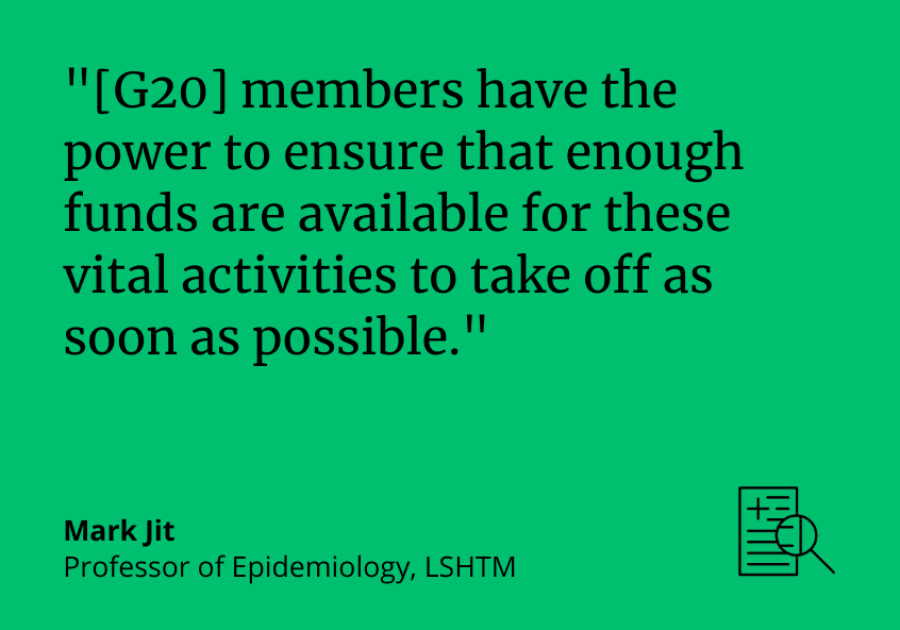Expert comment – Why does the G20 matter?
14 November 2022 London School of Hygiene & Tropical Medicine London School of Hygiene & Tropical Medicine https://lshtm.ac.uk/themes/custom/lshtm/images/lshtm-logo-black.png
What commitments do you hope G20 members will make to pandemic response and preparedness?
Virginia Wiseman, Professor of Health Economics and Health Systems at the Kirby Institute and at LSHTM, and Eduard J Beck, an Honorary Professor in the Department of Health Services Research and Policy at LSHTM, on behalf of all policy brief authors, read more:
"The COVID-19 pandemic has exposed worldwide inequities in access to medical technologies. Sustainable access to quality-assured and affordable preventive or therapeutic medical technologies, is a human right and a major requirement for successfully confronting contemporary and future pandemics, while strengthening health systems resilience. R&D is important for creating new products and LMICs should have rapid access to trial products: manufacturing should be diversified to produce medical technologies for other public health challenges.
"Barriers to intellectual property rights must be addressed. Legal mechanisms that currently cover COVID-19 vaccines, need to be extended to medicines and diagnostics: contemporary and future medical technologies must be covered by TRIPS flexibilities. Community involvement is key to ensuring equitable access to medical technologies for major public health problems. All sections of society and especially vulnerable populations, need to be identified and engaged. Countries must take the lead in implementing national programmes and ensure close alignment between "national", "regional" and "global" goals and aspirations."
How can G20 members better prepare the world for the next pandemic?
Adam Kucharski, Professor of Infectious Disease Epidemiology at LSHTM, said:
"COVID-19 showed how local disease threats can quickly become major global problems in our modern connected era. In the process, it also showed the importance of international knowledge exchange and collaboration: no single country had a monopoly on effective pandemic response. There were innovations in public health measures, vaccine development, variant surveillance, and treatment trials. To prepare for the next pandemic, countries will therefore need to learn from the best the world has to offer. They will also need to ensure that the necessary resources are equitably distributed, from data and diagnostics to clinical care and control options.
"Moreover, countries will need the flexibility to adapt to the range of potential threats we face. The next pandemic may be a virus that spreads rapidly though specific risk groups, like monkeypox. It may be a vector-borne infection, like Zika. It might be something else entirely. We won't know the exact nature of the threat until it arrives, but that makes it even more important to prepare now."
In light of the global COVID-19 response, what can G20 members do better in terms of financing the response to the next pandemic?
Mark Jit, Professor of Vaccine Epidemiology at LSHTM, said:
"A pandemic affects everyone, so it's in everyone's interest to work together to mitigate - or better still, contain and eliminate - the bug that causes the next pandemic. And with enough money, we can make a real dent to the destruction that a pandemic could cause. We can set up surveillance systems around the world to detect dangerous bugs before they spread. We can quickly develop new vaccines, treatments, diagnostic tests - we saw what a game-changer these were during the COVID-19 pandemic.
"All these developments can be global public goods that benefit every nation in the world. So it makes sense for us to pool our resources and tackle these challenges together, in a coordinated fashion, especially in an emergency situation where time is of essence. The G20 consists of countries that account for most of the world's national income, so its members have the power to ensure that enough funds are available for these vital activities to take off as soon as possible."
Our postgraduate taught courses provide health practitioners, clinicians, policy-makers, scientists and recent graduates with a world-class qualification in public and global health.
If you are coming to LSHTM to study a distance learning programme (PG Cert, PG Dip, MSc or individual modules) starting in 2024, you may be eligible for a 5% discount on your tuition fees.
These fee reduction schemes are available for a limited time only.